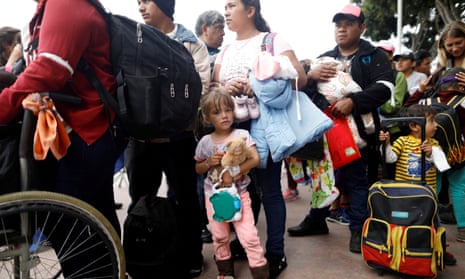Nearly 200 Central American people who have been travelling north through Mexico for a month with the aim of seeking asylum in the US have been stopped at the border after inspectors said a crossing facility could not accommodate them.
Donald Trump vowed last week to stop the annual “Stations of the Cross caravan”, while cabinet members said they would deliver a swift response.About 50 asylum seekers were allowed through a gate controlled by Mexican officials to cross a bridge but were stopped at the entrance to the US inspection facility at the other end. They were allowed to wait outside the building, technically on Mexican soil, without word of when officials would let them claim asylum.
About 50 others remained outside the Mexican side of the crossing in Tijuana, prohibited from crossing the bridge.
Earlier, the asylum seekers had travelled in school buses under police escort to a beachfront rally in Tijuana, where a steel fence juts out into the Pacific Ocean. They sang the Honduran national anthem, and supporters on the San Diego side of the fence waved a Honduran flag.
After a final briefing from lawyers and minutes before they were due to walk to the border crossing, the US Customs and Border Protection (CBP) commissioner, Kevin McAleenan, announced that the San Ysidro border crossing, the country’s busiest, had “reached capacity” for people without legal documents and that asylum seekers may need to wait in Mexico temporarily.
Trump has commented frequently on the caravan since it started its journey on 25 March near the Guatemala border in southern Mexico. His administration has vowed to end “legal loopholes” and “catch-and-release” policies that allow people seeking asylum to be released from custody into the US while their claims go through the courts, which can take years.
The attorney general, Jeff Sessions, has called the caravan “a deliberate attempt to undermine our laws and overwhelm our system”. The homeland security secretary, Kirstjen Nielsen, said asylum claims would be resolved “efficiently and expeditiously” and warned that anyone making false claims could be prosecuted.
The administration’s warnings left organisers in disbelief that border inspectors were not ready for them.
“They have been well aware that a caravan is going to arrive at the border,” Nicole Ramos, an attorney working on behalf of caravan members, said at a news conference. “The failure to prepare, and failure to get sufficient agents and resources is not the fault of the most vulnerable among us. We can build a base in Iraq in under a week. We can’t process 200 refugees. I don’t believe it.”
The San Ysidro facility can hold about 300 people, according to Pete Flores, the CBP’s San Diego field office director. The agency processed about 8,000 asylum cases from October to February, the equivalent of about 50 a day.
Asylum seekers are typically held for up to three days at the border and then turned over to US Immigration and Customs Enforcement. If they pass an initial screening, they may be detained or released into the US with ankle monitors.
The asylum seekers did not appear to be discouraged by the delay.
Wendi Yaneri Garcia said she was confident she would be released while her case was pending because she was travelling alone with her two-year-old son, who has been sick. She said police in her home town of Atlantida, Honduras, had jailed her for protesting against the construction of a hydroelectric plant and that she had received death threats after being released.
“All I want is a place where I can work and raise my son,” the 36-year-old said.
Elin Orrellana, a 23-year-old pregnant woman from El Salvador, said she was fleeing the MS-13 street gang, a favourite target of both Sessions and Trump because of their brutal killings in communities in the US. She said her older sister had been killed by the gang, so she was trying to join family members in the Kansas City area.
“Fighting on is worth it,” she said.








